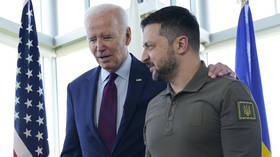White House backs transfer of controversial cluster bombs to Ukraine

US President Joe Biden has greenlighted the supply of cluster munitions to Ukraine as part of the Pentagon’s 42nd arms package for Kiev’s forces. The White House said that Biden made the decision despite the risk of harm to civilians.
The president approved the transfer based on “unanimous” advice from his national security team, National Security Adviser Jake Sullivan told reporters on Friday.
US officials “recognize that cluster munitions create a risk of civilian harm from unexploded ordnance. This is why we deferred the decision for as long as we could,” Sullivan said, before arguing that the supply of cluster bombs is not “that much of an addition of civilian harm,” as Russia has allegedly used them in Ukraine already.
Cluster munitions are banned in more than 120 countries because when they detonate, they release many small ‘bomblets’ over a wide area, with these unexploded elements posing severe risks to civilians for years after fighting ends.
The US, Ukraine, and Russia are not parties to the ban. The US, however, has prohibited exports of the armaments with a ‘dud’ rate of more than 1%, but this restriction can be lifted by presidential waiver.
The cluster bombs sent to Ukraine will have a failure rate of up to 2.35%, Undersecretary of Defence for Policy Colin Kahl told reporters on Friday. Kahl claimed that Ukraine would not use these munitions in “civilian-populated urban areas,” despite Kiev’s track record of using Western-supplied weapons systems against civilians in Donetsk and Lugansk.
Kahl explained that the cluster munitions in question will be dual-purpose improved conventional munitions (DPICM), which can be fired from Ukraine’s NATO-supplied 155mm artillery systems. Asked whether the US decided to send DPICM shells due to a shortage of conventional 155mm rounds, Kahl seemingly confirmed the shortfall, explaining that the cluster shells would serve as a “bridge” until NATO members could ramp up production of conventional shells.
Kahl refused to say how many DPICM rounds would be sent to Ukraine, but said that there are “hundreds of thousands” of such shells in US stockpiles, which could potentially be doled out to Kiev over multiple military aid packages.












